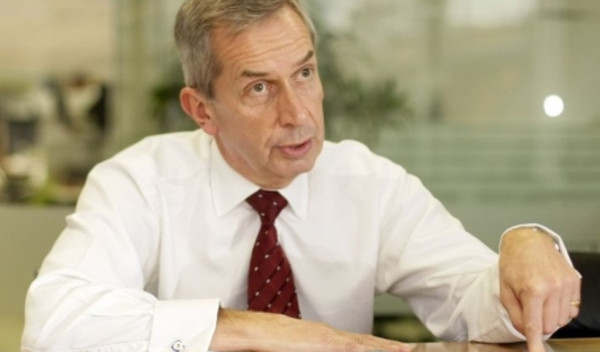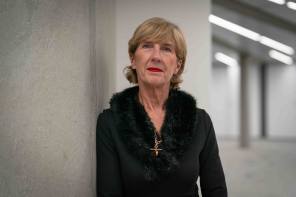

The Forest Gate district of east London has changed over the past decade, the bars selling craft beers and exotic cocktails grapple with artisanal coffee shops for dominance.
Terry Smith, manager of the biggest retail fund in the UK, grew up in the Forest Gate of the 1960s, a very different place to today.
Since then he has built a career at the top of financial services in London, and latterly, running the £26bn Fundsmith Equity fund, as well as running the wider Fundsmith business.
But on the wall of his office in Mauritius, the Indian ocean island to which he relocated in 2014, he has an old photograph of the area from 50 years ago, and on the day he spoke to FTAdviser, he had been in touch with the chap he sat next to in school as a five year old.
Smith is now 68, but his accent retains the typical east London twang.
He says: “I was born in poor circumstances; my father was a lorry driver, my mother worked in factories and as a cleaner. We didn’t have an indoor toilet at home.
"I remember in 1963 being sent home from primary school because it only had an outside toilet and it froze. It didn’t help me much though, because we only had an outdoor toilet at home as well.
"You learn not to take things for granted. I am still in touch with some of the people I knew in Forest Gate in London, where I grew up. The guy I sat beside in school when I was 5 years old is invested in the fund and was in touch with me today.
"You also realise that there are people who are intelligent, well-educated and hardworking and they still fail. Luck plays a part as well, and people in my position should never forget that.”
Whenever Smith’s name is mentioned in the City now, the chat soon turns to his wealth.
The latest accounts for Fundsmith indicate he was paid £36m in the year to the end of March 2021; there is a business in Mauritius to which Fundsmith paid £150m for services, several media outlets include this figure directly as part of his annual remuneration, but the sum covers a range of costs associated with running the business and its office in the country.
His personal holding in the Fundsmith Equity fund is north of £200m, and if he wanted to, he could have retired many years ago.
Smith says: “I could certainly have retired. I don’t have a particularly expansive lifestyle. I like what I do and I am interested in what I do. I enjoy running money like this, learning about investment, companies and markets. I don’t play golf or fish. If I wasn’t investing professionally, I would be managing my own money in the same way that we invest at Fundsmith.”
He says managing money for others means he must put in the infrastructure of a professional operation. He also works with Julian Robins, Fundsmith’s US-based head of research, and a person with whom the fund manager has worked across multiple businesses for more than 30 years.
Smith says of their collaboration: “Sometimes when he writes up something very interesting about one of our companies or a market they operate in, at the end he will say, 'You gotta love this job!', and I do. People have said to me I changed their life; their retirements are secure because of Fundsmith. They tell me they were with someone else who didn’t really make them money for retirement and then Fundsmith did, and I am proud of that.”
Although he presently runs the largest retail fund in the UK market, Smith is in some ways an accidental fund manager.
After graduating in history from Cardiff University, he began working for Barclays bank in the 1970s, and even managed the Pall Mall branch, before moving to the finance department and completing an MBA.
While working as a financials analyst at Barclays BZW, Smith wrote a note advising that the clients should sell the shares of Barclays.
Barclays could not be seen to remove him for it, but he left the business and became head of UK companies research at UBS Phillips and Drew in 1990.
Growing pains
When he joined UBS, the UK was in the teeth of a deep recession, and several high-profile businesses went bust.
Smith was asked by clients and others how those businesses had failed, given that some had reported large profits shortly before going bust.
So Smith wrote a research report called “Accounting for growth”, to explain how some businesses were using dubious accounting methods to make it seem as though they were more profitable than they were.
The research paper became a book, legal action from UBS led to a wave of publicity and the book was propelled to the top of the best-seller list.
The problem was some of the corporate clients of UBS were upset and he was fired and sued by UBS after citing some of its clients in his book.
As a result, he went from head of research at the large City institution, to holding the same title at a start-up firm called Collins Stewart, where his head of research title was something of a misnomer, as there were not, initially, any other researchers.
Going solo
And so the germ of today's fund management business began.
He says: “I started reading Warren Buffett’s annual letters in 1979 and went into stock broking a few years later. When I was at UBS, I was about to hire a fund manager who had a first [class degree] in maths to work with me to develop a quantitative research methodology to define two things: is it a good or bad company and do I want to own it? And is it a cheap or expensive share, so do I want to own it right now? But I was fired for writing a book exposing accounting fraud before I could hire him.
"Then I went to help set up Collins Stewart, becoming the head of research. It was a start-up and I was employee number nine. I called that guy and asked if he would join me, and so we devised what would today be called an algorithm, with a database. That became Quest, which was used by lots of firms around the world and I came to the conclusion that this was a strategy that works and could deliver superior risk-adjusted returns and was one I could deliver.”
The Quest system remains in use in the City today, but Smith’s first chance to put it into practice was when Collins Stewart, where Smith was by now chief executive, acquired rival business Tullett Liberty in 2003.
The latter firm had a substantial pension deficit, and Smith persuaded the trustees to fire the existing investment adviser and let him do the job. He immediately removed any bonds from the portfolio and deployed all of the capital into 20 equities, the sort of concentrated portfolio that is Fundsmith Equity’s hallmark.
He says when he left Collins Stewart in 2010, he resolved to set up a fund management business. Initially he combined this with running the Tullett Prebon business, which was de-merged from Collins Stewart and in which he held a 6 per cent equity stake.
In 2014, he left Tullett to run Fundsmith full time, and when Tullett was later sold, he deployed all of the sale proceeds into the fund.
Value plays
Smith’s detractors point out that Fundsmith has only really existed, and thrived, in an era when low interest rates have prevailed, and his growth style of investing was in favour, but in a world of tighter monetary policy, that style may encounter choppy waters.
The fund manager does not pretend otherwise, saying he has never claimed he can outperform in all market conditions, and uses an example from another of his hobbies, cycling, to elaborate.
He says: “The analogy I use is that of the Tour de France, no cyclist has won every stage and they never will. You can’t be a sprinter and win the time trial, they require different physiques.
"Several times the overall race has been won by someone who didn’t win any of the individual stages. You need to be the best overall, and that’s what we are trying to achieve.
"Of course, with some of the companies we own they will do less well as economies have a period of recovery, because many of them have nothing to recover from. That’s not to say we shouldn’t expect a bumpy ride from inflation, but I think our companies have high gross margins and will deal with it well in the long term.”
He is more blunt towards commentators who advocate exiting the fund for a short period until market conditions move his way. He says folk contemplating such a move are probably in the wrong fund in the first place – he used less temperate language recently when describing these commentators, citing former German Chancellor Helmut Kohl who said “Nothing so disappoints deserting rats as a ship which refuses to sink”.
He says: “There may be some clients out there who want to sell our fund and move to something else to try to capture value, and then come back to us, but I would say, if that’s how they think, this fund isn’t for them.
"And also, trying to do that means getting not only macro events correct, but getting the impact on the market of those events correct. I have been working in this industry for 48 years and I have never met anyone who can do that – I certainly can’t.
"Markets are a second order system. For example, if, in 2019, I had shown some incredible foresight and said 'There will be a pandemic and the responses of governments will mean GDP falls by 10 per cent very quickly', the response of many would be to sell their equity holdings. But Fundsmith grew 18 per cent in 2020, and equity markets also rose by double digits.”
Future-proofing
Fundsmith has little invested in the obvious technology plays that are popular with many other growth funds. Advocates of investing in those businesses take the view that we live in an era of radical technological change that will disrupt, and potentially destroy, the business models of many of the types of companies in which he invests.
But he says that while sceptical that sectors such as business travel will ever recover to pre-pandemic levels, that disruption is generally not a new concept in economies.
He says: “I think one of the things people might be getting wrong is the assumption that disruption is new, or that the scale of it is greater than in the past. We are very prone to recency bias. I did a history degree and one of the modules I did was economic history. I am convinced we can draw lessons from the past in terms of disruption.
"For example, the impact of the invention of the spinning jenny on the cotton industry was huge. The impact of the engine on the agricultural industry which had used the horse and cart was huge. It is easy to identify the losers from these changes, whereas finding the winners is more difficult.

"People might talk of Henry Ford and how he changed the way production worked, but the Ford Motor Company was his third venture and the first two failed. I am not convinced there is more disruption, we just try to be aligned with it.”
Having returned £5,400 of profit for every £1,000 invested since 2010, more than twice the returns of the wider market, his clients will be hoping the fund manager sticks around a while longer.
David Thorpe is special projects editor of FTAdviser



